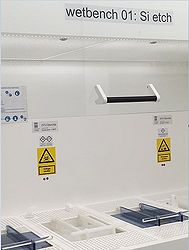Specific Process Knowledge/Etch/KOH Etch
Feedback to this page: click here
Unless anything else is stated, everything on this page, text and pictures are made by DTU Nanolab.
All links to Kemibrug (SDS) and Labmanager Including APV and QC requires login.
Si etch - Anisotropic silicon etch
KOH belongs to the family of anisotropic Si-etchants based on aqueous alkaline solutions. The anisotropy stems from the different etch rates in different crystal directions. The {111}-planes are almost inert whereas the etch rates of e.g. {100}- and {110}-planes are several orders of magnitude faster.
KOH-etching is a highly versatile and cheap way to realize micro mechanical structures if you can live with the necessary Si3N4- or SiO2-masking materials and the potassium contamination of the surface. The latter necessitates in most cases a wet post-clean ('7-up' or RCA-clean) if the wafer is to be processed further.
At DTU Nanolab we use as a standard a 28 wt% KOH. The etch rate - and the selectivity towards a SiO2-mask - is depending on the temperature. We normally use T=80 oC but may choose to reduce this to e.g. 60 oC or 70 oC in case of a high-precision timed etch (e.g. defining a thin membrane). In some cases we recommend to saturate the standard 28 wt% KOH with IPA with an etch temperature at T=70 oC (reduce evaporation of IPA). One example is for boron etch-stop, where the selectivity towards the boron-doped silicon is improved compared to the standard etch. Etching with IPA added to the KOH solution (250ml IPA/1000ml KOH) can be done in KOH fumehood.
- Different places to do anisotropic wet silicon etch
The user manuals, quality control procedures and results, user APVs, technical information and contact information can be found in LabManager:
Si Etch 1: KOH info page in LabManager,
Si Etch 2: KOH info page in LabManager,
Si Etch 3: KOH info page in LabManager
Process Information
KOH etching baths
Key facts for the different etch baths available at DTU Nanolab are resumed in the table:
| Equipment | Si Etch 01: KOH | Si Etch 02: KOH | Si Etch 03: KOH | |
|---|---|---|---|---|
| Purpose |
|
|
|
The bath is dedicated wafers with metal or otherwise dirty wafers |
| Link to safety APV and SDS | ||||
| Performance | Etch rates in crystalline silicon (100) |
|
|
|
| Etch rates in crystalline silicon (110) |
|
|
| |
| Etch rates in Thermal SiO2 |
|
|
| |
| Etch rates in other oxides |
. |
yannickseis@nbi.ku nov. 2017 @80 °C:
jemafh@nilt 2019-Marts:
|
. | |
| Etch rates in PECVD SiN | See etchrates for PECVD SiN here | |||
| Roughness |
|
|
| |
| Anisotropy |
|
|
| |
| Process parameter range | Chemical solution |
KOH:H2O - 1000 ml: 1200 ml, when using premixed 50% KOH solution |
KOH:H2O - 500 g : 1000 ml, when using pills KOH:H2O - 1000 ml: 1200 ml, when using premixed 50% KOH solution |
KOH:H2O - 500 g : 1000 ml, when using pills KOH:H2O - 1000 ml: 1200 ml, when using premixed 50% KOH solution |
| Temperature |
|
|
| |
| Substrates | Batch size |
|
|
|
| Size of substrate |
|
|
| |
| Allowed materials |
|
|
| |
| Masking material |
|
|
| |
1 Measured by Eric Jensen from DTU-Nanotech, October 2013.

